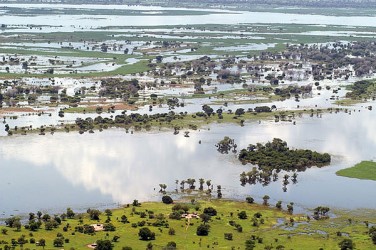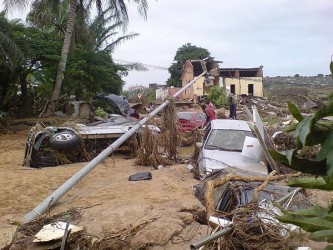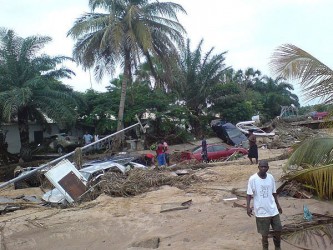DFID Mozambique has been thinking about how to address the key challenges set out in DFID’s White Paper ‘Building our Common Future’, which was published in July this year.

Rita Zacarias, pictured here holding the cover of the soon to be published draft climate change strategy has been recruited to consider how action on climate change can be addressed across the DFID supported programmes. Rita has already had a huge impact on thinking within the office, and the discussions she has prompted in setting out the key issues will help to shape DFID’s future engagement in Mozambique.
Many of you will remember the horrifying pictures of Mozambique’s floods in 2000. After 5 weeks of almost unrelenting rain in the opening months of 2000, much of the country was underwater, with 1000’s of deaths and more than one million people made homeless. Mozambique, as a country which is vulnerable to natural disasters, understands more than most countries the importance of being prepared and the importance of acting now to avoid the damage from further climate change.
A recent and detailed study of the effects of climate change on Mozambique carried out by INGC, has confirmed that the country will continue to suffer the impacts of cyclones, floods, droughts, sea level rise and disease outbreaks. A key observation is that "the exposure to natural disaster risk in Mozambique will increase significantly over the coming 20 years and beyond". Erosion could push the 2,700km coastline inland by 500m or more. With around 12 million people, which is 60 percent of the population, living in coastal areas this could be catastrophic for Mozambique."
I have added a few pictures showing the impact of Cyclone Jokwe below, which hit Vilankulos in Mozambique in 2008.
Climate Change is a priority of the White Paper. DFID believes that our country programmes need to be ‘climate proofed’ as much as possible by factoring mitigation measures or preparedness to our programmes. The intention of addressing climate change across the office is to help protect the investments being made in the country, to encourage climate-friendly development and to provide more sustainable support for poverty reduction.
In the health sector, climate change will have a number of important impacts. Good friends of mine Madeleine Thomson and Steve Connor, who I know from my days at the Liverpool School of Tropical Medicine and Hygiene, and who now work with the International Resarch Institute for Climate and Society, have been using satellite data to map the changing effect of surface temperature and vegetation density on disease prevalence. The work demonstrates that climate change can have an important negative impact on disease transmission, and it will be important for the health sector to prepare for the impacts of climate change.
Everyone in the DFID Mozambique office will be giving the challenge of climate change full attention over the coming months and we are hoping that the work being led by Rita will help us to ‘climate proof’ UK aid to Mozambique.



As promised, here are the pictures showing the impact of Cyclone Jokwe...
This blog features as part of Blog Action Day and the Act on Copenhagen campaign




4 comments
Comment by Madeleine Thomson posted on
Hi Neil
Just thought that you and your blog community might like to see this video on climate and health in Africa - with a focus on meningococcal meningitis - not such a key disease for Mozambique perhaps but the collaboration model can be readily adapted to other health and climate issues.
http://www.youtube.com/watch?v=ZI_U9BhNINI&feature=related
you can find it via our website or on the Google COPENHAGEN (COP15) landing page http://www.google.com/landing/cop15/. It shows how it may be possible to work with the met community to improve health outcomes from climate sensitive diseases.
Best
Madeleine
Comment by patik örnekleri posted on
ne yazsam onaylayacaksin onun icin onemi yok.
Comment by Joshua Jackowski posted on
Just proves the old adage. It's an ill wind that blows no good.
Comment by CivicSurf » Blog Action Day: Climate Change blogging posted on
[...] Sarah Sanyahumbi has posted about late monsoons in Nepal and Neil Squires reflects on how the floods in 2000 that left much of Mozambique underwater make the country understand the need to be p.... [...]